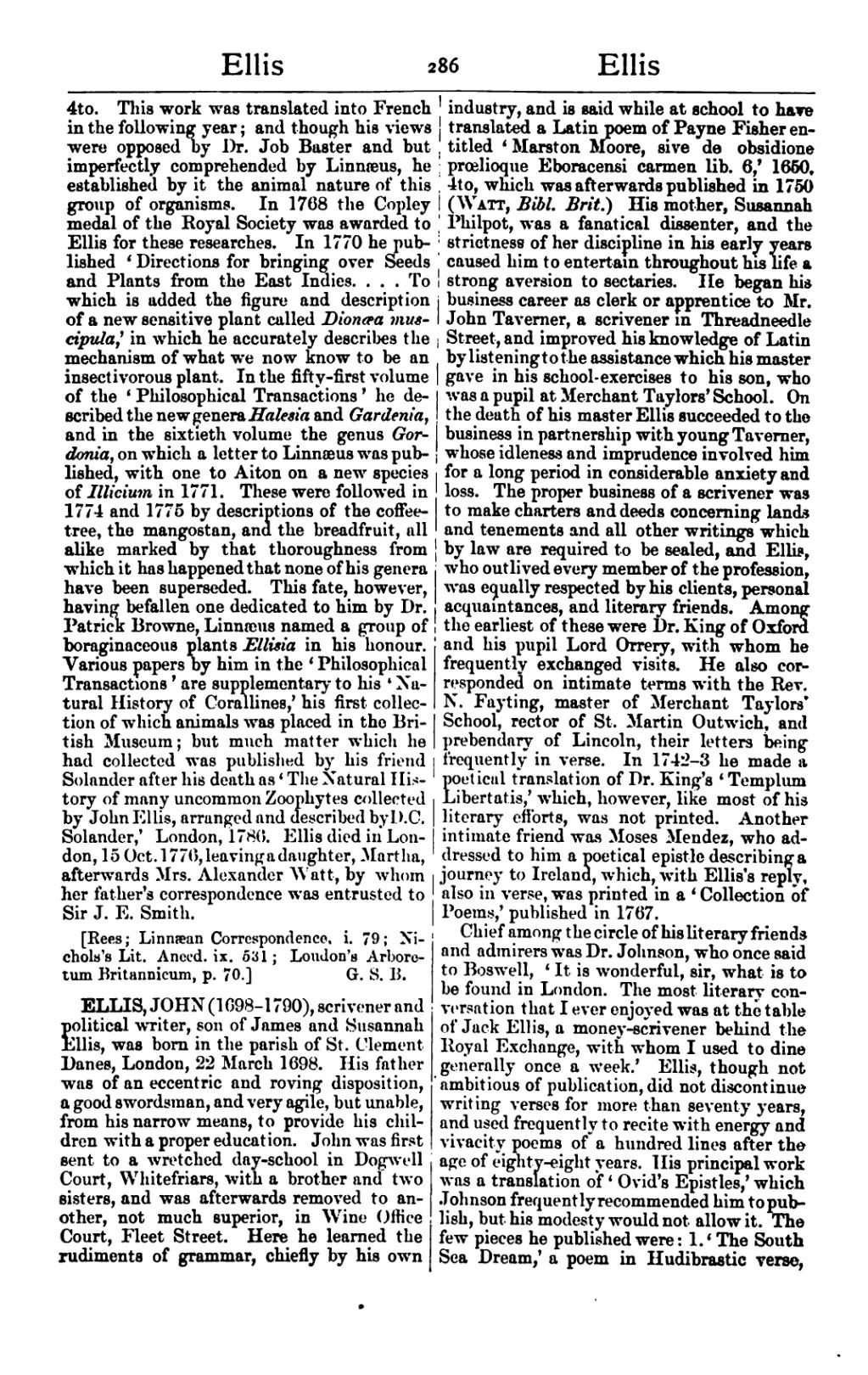4to. This work was translated into French in the following year; and though his views were opposed by Dr. Job Baster and but imperfectly comprehended by Linnæus, he established by it the animal nature of this group of organisms. In 1768 the Copley medal of the Royal Society was awarded to Ellis for these researches. In 1770 he published 'Directions for bringing over Seeds and Plants from the East Indies. … To which is added the figure and description of a new sensitive plant called Dionæa muscipula,' in which he accurately describes the mechanism of what we now know to be an insectivorous plant. In the fifty-first volume of the 'Philosophical Transactions' he described the new genera Halesia and Gardenia, and in the sixtieth volume the genus Gordonia, on which a letter to Linnæus was published, with one to Aiton on a new species of Illicium in 1771. These were followed in 1774 and 1775 by descriptions of the coffee-tree, the mangostan, and the breadfruit, all alike marked by that thoroughness from which it has happened that none of his genera have been superseded. This fate, however, having befallen one dedicated to him by Dr. Patrick Browne, Linnæus named a group of boraginaceous plants Ellisia in his honour. Various papers by him in the 'Philosophical Transactions' are supplementary to his 'Natural History of Corallines,' his first collection of which animals was placed in the British Museum; but much matter which he had collected was published by his friend Solander after his death as 'The Natural History of many uncommon Zoophytes collected by John Ellis, arranged and described by D.C. Solander,' London, 1786. Ellis died in London, 15 Oct. 1776, leaving a daughter, Martha, afterwards Mrs. Alexander Watt, by whom her father's correspondence was entrusted to Sir J. E. Smith.
[Rees; Linnæan Correspondence, i. 79; Nichols's Lit. Anecd. ix. 531; London's Arboretum Britannicum, p. 70.]
ELLIS, JOHN (1698–1790), scrivener and political writer, son of James and Susannah Ellis, was born in the parish of St. Clement Danes, London, 22 March 1698. His father was of an eccentric and roving disposition, a good swordsman, and very agile, but unable, from his narrow means, to provide his children with a proper education. John was first sent to a wretched day-school in Dogwell Court, Whitefriars, with a brother and two sisters, and was afterwards removed to another, not much superior, in Wine Office Court, Fleet Street. Here he learned the rudiments of grammar, chiefly by his own industry, and is said while at school to have translated a Latin poem of Payne Fisher entitled 'Marston Moore, sive de obsidione prœlioque Eboracensi carmen lib. 6,' 1660, 4to, which was afterwards published in 1750 (Watt, Bibl. Brit.) His mother, Susannah Philpot, was a fanatical dissenter, and the strictness of her discipline in his early years caused him to entertain throughout his life a strong aversion to sectaries. He began his business career as clerk or apprentice to Mr. John Taverner, a scrivener in Threadneedle Street, and improved his knowledge of Latin by listening to the assistance which his master gave in his school-exercises to his son, who was a pupil at Merchant Taylors' School. On the death of his master Ellis succeeded to the business in partnership with young Taverner, whose idleness and imprudence involved him for a long period in considerable anxiety and loss. The proper business of a scrivener was to make charters and deeds concerning lands and tenements and all other writings which by law are required to be sealed, and Ellis, who outlived every member of the profession, was equally respected by his clients, personal acquaintances, and literary friends. Among the earliest of these were Dr. King of Oxford and his pupil Lord Orrery, with whom he frequently exchanged visits. He also corresponded on intimate terms with the Rev. N. Fayting, master of Merchant Taylors' School, rector of St. Martin Outwich, and prebendary of Lincoln, their letters being frequently in verse. In 1742-3 he made a poetical translation of Dr. King's 'Templum Libertatis,' which, however, like most of his literary efforts, was not printed. Another intimate friend was Moses Mendez, who addressed to him a poetical epistle describing a journey to Ireland, which, with Ellis's reply, also in verse, was printed in a 'Collection of Poems,' published in 1767.
Chief among the circle of his literary friends and admirers was Dr. Johnson, who once said to Boswell, 'It is wonderful, sir, what is to be found in London. The most literary conversation that I ever enjoyed was at the table of Jack Ellis, a money-scrivener behind the Royal Exchange, with whom I used to dine generally once a week.' Ellis, though not ambitious of publication, did not discontinue writing verses for more than seventy years, and used frequently to recite with energy and vivacity poems of a hundred lines after the age of eighty-eight years. His principal work was a translation of 'Ovid's Epistles,' which Johnson frequently recommended him to publish, but his modesty would not allow it. The few pieces he published were:
- 'The South Sea Dream,' a poem in Hudibrastic verse,
